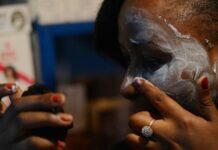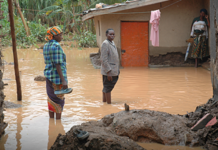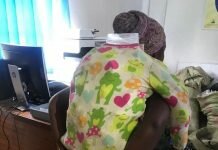
Family and supporters of Paul Rusesabagina, an activist depicted in the Oscar-nominated film Hotel Rwanda, are decrying as a sham his terrorism trial that began this week. He was one of 20 defendants appearing before a judge in a courtroom outside Kigali.
“These are defendants who are on trial for their lives and possibly life imprisonment,” said Brian Endless, a professor at Loyola University-Chicago’s Political Science Department who has worked with Rusesabagina’s foundation. “Most importantly, there were no lawyers next to them to assist in their defense. Their lawyers were kept in the back of the room. And just the physical dynamics of that were, kind of, incredible to see.”
Rusesabagina gained international recognition for saving hundreds of people by providing shelter in the Hotel des Mille Collines, which he managed. In the film, he is depicted helping to save mainly Tutsi people who sought refuge during the killing that claimed hundreds of thousands of lives in a 100-day period.
Rusesabagina comes from a Hutu and Tutsi background. After the genocide, he adopted orphans. In 2005, U.S. President George W. Bush awarded him the Presidential Medal of Freedom.
Now, the daughters are fighting to get their adoptive father back home. Two of Rusesabagina’s daughters, as well as a team of lawyers and supporters, watched Wednesday’s proceedings livestreamed from Kigali.
The man hailed as a hero for saving hundreds of lives during the 1994 Rwandan genocide stands accused of sponsoring terrorism in the country for his support of an opposition party and rebel groups. Family members and advocates claim he was effectively kidnapped in September when he boarded a private plane in Dubai on false pretenses and was flown against his will to the Rwandan capital.
“I would like to insist on the fact that Rusesabagina is in Rwanda illegally,” Rusesabagina’s lawyer, Gatera Gashabana, told reporters in Rwanda. “He did not come following an extradition. He didn’t even come of his own free will. He found himself in Rwanda against his will.”
During the proceedings at the Supreme Court in Kimihurura, Rusesabagina insisted the court did not have jurisdiction because he is a Belgian citizen and was unlawfully abducted. Rwanda’s President Paul Kagame has defended the means used to arrest Rusesabagina.
“There was no kidnap. There was not any wrongdoing in the process of his getting here,” Kagame said in state media in September 2020, when Rusesabagina was initially arrested. “He got here on the basis of what he believed and wanted to do.”
The trial has prompted international criticism.
Thirty-seven U.S. senators and representatives signed a letter to Kagame calling for Rusesabagina’s release on humanitarian grounds since he is a cancer survivor. They expressed “grave concerns” about the “extrajudicial” way he was brought to the country. The U.S. State Department also said it is closely monitoring the situation and has engaged the Rwandan government at its highest levels.
“We continue to underscore that the legal process adjudicating the charges against Mr. Rusesabagina must be fair, transparent, respect the rule of law and be consistent with Rwanda’s own international human rights obligations and commitments,” Ned Price, State Department spokesperson, said during a press conference on Wednesday.
Rusesabagina’s daughter Carine Kanimba said she has been receiving harassing phone calls and text messages from someone claiming to be her father’s guard in jail. He told her he wanted to help her father escape, a ploy she believes is intended to add charges to Rusesabagina or even give authorities an excuse to execute him.
“We just know that this is a method that they use. And it’s very inhumane considering the condition that our family is in and the worries we have for our father,” Kanimba said. “We will get our father out of that prison legally, not through these methods.”
Rusesabagina did not enter a plea during his court appearance on Wednesday. The judge is expected to rule on the question of whether the court has jurisdiction on February 26.
The 66-year-old has had detractors who say his role was overblown and not entirely accurate.
Phil Clark, professor of international politics at the SOAS University in London who has studied the region, said there are concerns within Rwanda of Hollywood’s depiction of Rusesabagina.
“Many survivors who were inside the Hotel des Mille Collines during the genocide have come out and said that Rusesabagina, in fact, charged many of those survivors quite exorbitant fees to have safe haven within the hotel. And that Rusesabagina allegedly also handed over some Tutsi to the Hutu militias to be killed,” he told VOA via Skype after Rusesabagina was arrested.
“But I think while there might be some skepticism about exactly what Rusesabagina did in 1994, I think we also have to recognize that there has been an active smear campaign against him, that in 1995 and 1996, he became increasingly vocal against Kagame’s regime.”
Clark added that after Rusesabagina’s exile, and because he was a dissenting voice, Kagame initiated a government-orchestrated smear campaign against him.
“There has been this government attempt to try to denigrate him as an individual as he became a much more vocal critic,” he said. “And that’s the backdrop to this current court case, that there has been a battle going on for Rusesabagina’s reputation long before he became the leader of an opposition political movement. And long before he allegedly had any connection to the rebel movements in eastern Congo.”
voa











































